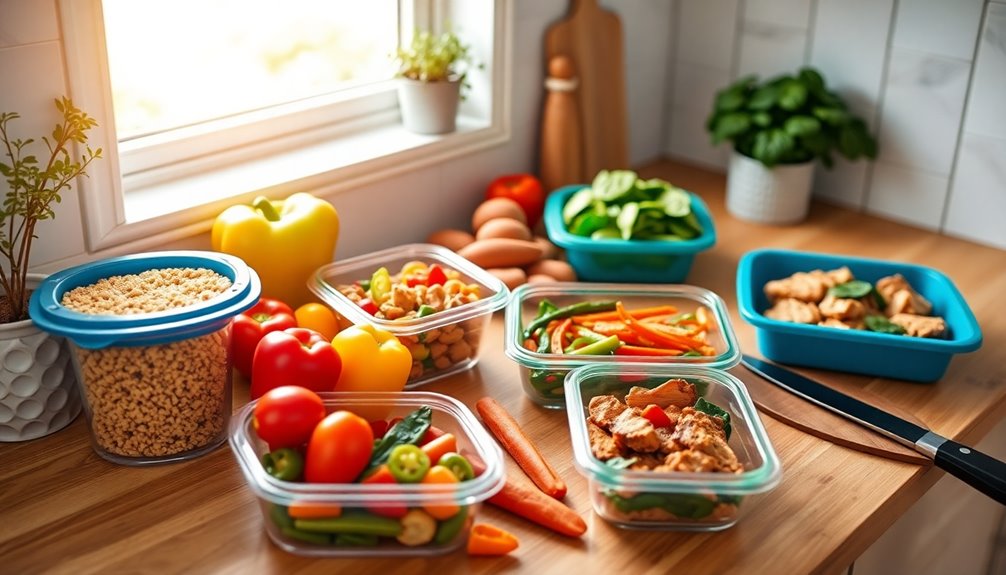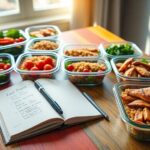Meal prepping is a smart way to save money and eat healthier as a family. Start by purchasing cost-effective staples like rice, beans, and seasonal vegetables in bulk. Batch cook nutritious options like one-pan bakes or homemade pizzas to please the kids. Organize your kitchen and set aside a consistent time each week for prep. Use durable containers to store meals and consider freezing extras for later. Involving the whole family makes it fun and less of a chore. If you want to explore more efficient storage ideas and recipes tailored for families, keep an eye out for further insights.
Key Takeaways
- Shop in bulk for affordable staples like rice, beans, and pasta to save money on meal prep ingredients.
- Incorporate seasonal produce to maximize freshness and reduce costs in your weekly meal prep.
- Use plant-based ingredients and frozen fruits/vegetables for nutritious, budget-friendly meals that cater to dietary goals.
- Organize meal prep days with the family to share the workload and make cooking together enjoyable and cost-effective.
- Invest in quality storage containers for efficient meal portioning and to minimize food waste during meal prep.
Benefits of Meal Prepping
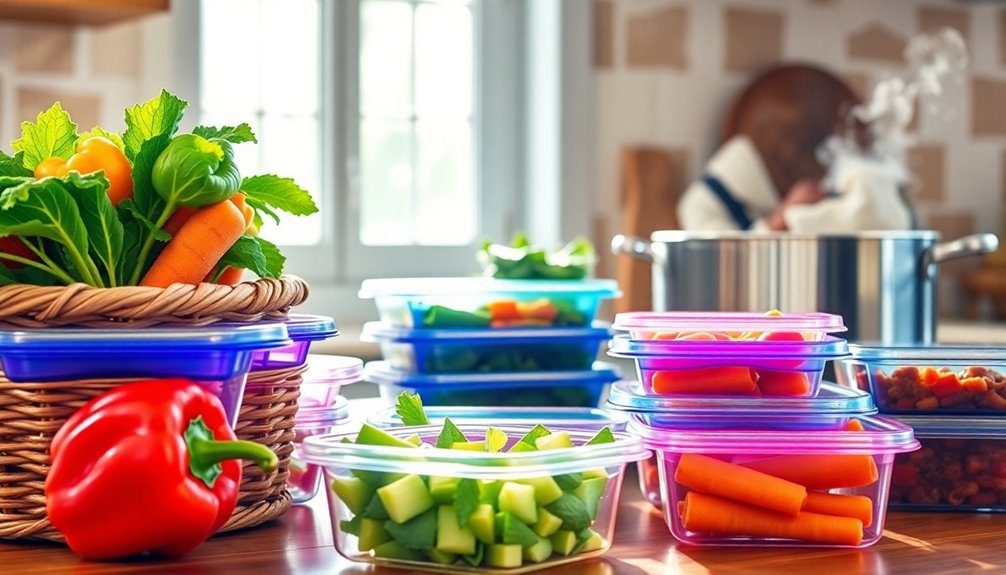
When it comes to meal prepping, one of the biggest benefits lies in the significant time it can save you during busy weekdays. By dedicating just a few hours on the weekend or during your free time, you can prepare meals in advance, eliminating the daily struggle of deciding what to eat. This time savings enables you to focus on other important aspects of your life, whether that's spending quality moments with family, pursuing hobbies, or simply unwinding after a long day.
Furthermore, meal prepping promotes healthy eating habits. When you have nutritious meals ready to go, you're less likely to reach for unhealthy convenience foods or takeout options. Studies show that individuals who engage in meal prepping are more likely to meet their dietary goals, leading to better overall health. You'll find that having balanced meals at your fingertips encourages mindful eating, which can positively impact both your physical and mental well-being. Additionally, meal prepping can align with a custom keto diet plan, helping you stay on track with your dietary preferences and goals.
Moreover, meal prepping fosters a sense of community. When you share your meal prep ideas with friends or family, you create opportunities for bonding. You can swap recipes, share tips, and even prep meals together, building connections over food. This collaborative effort not only strengthens relationships but also reinforces your commitment to maintaining a healthy lifestyle.
Essentially, meal prepping not only saves you precious time but also enhances your well-being and brings you closer to those you care about. So, why not give it a try? You might just find it transforms your week!
Cost-Effective Ingredients to Use
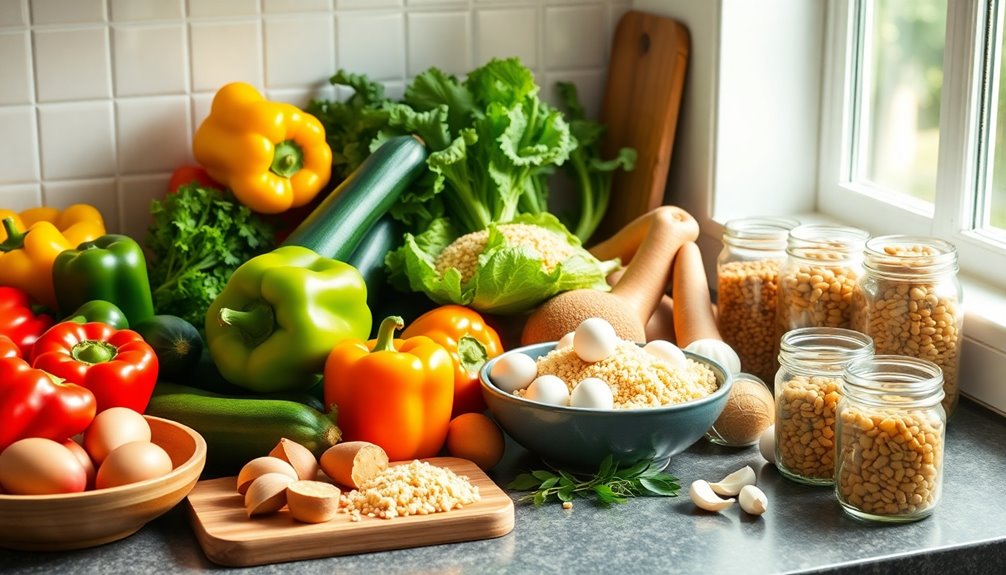
While it might seem challenging to eat well on a budget, incorporating cost-effective ingredients into your meal prep can make a significant difference. One of the best strategies is bulk shopping. Purchasing staples like rice, beans, and pasta in larger quantities not only saves money but also provides a solid foundation for various meals. These ingredients are versatile, filling, and have a long shelf life, making them perfect for your family's weekly menu.
Another key approach is to focus on seasonal produce. Fruits and vegetables that are in season are typically cheaper and fresher. They taste better, too! Head to your local farmers' market or grocery store and look for what's abundant during that time of year.
For instance, in the summer, tomatoes and zucchini are plentiful, while root vegetables like carrots and potatoes shine in the fall. Incorporating these seasonal ingredients into your meals not only nourishes your family but also supports local farmers and reduces your environmental footprint. Additionally, using plant-based ingredients can significantly enhance your meals while promoting better health for your family.
Don't forget about frozen fruits and vegetables as well. They're often picked at peak ripeness and can be just as nutritious as fresh options. By planning your meals around these cost-effective ingredients, you'll be able to create delicious, healthy dishes while keeping your grocery bills in check. Embracing these strategies can help you foster a sense of community and belonging, as you share nourishing meals with your loved ones without breaking the bank.
Simple Meal Prep Recipes
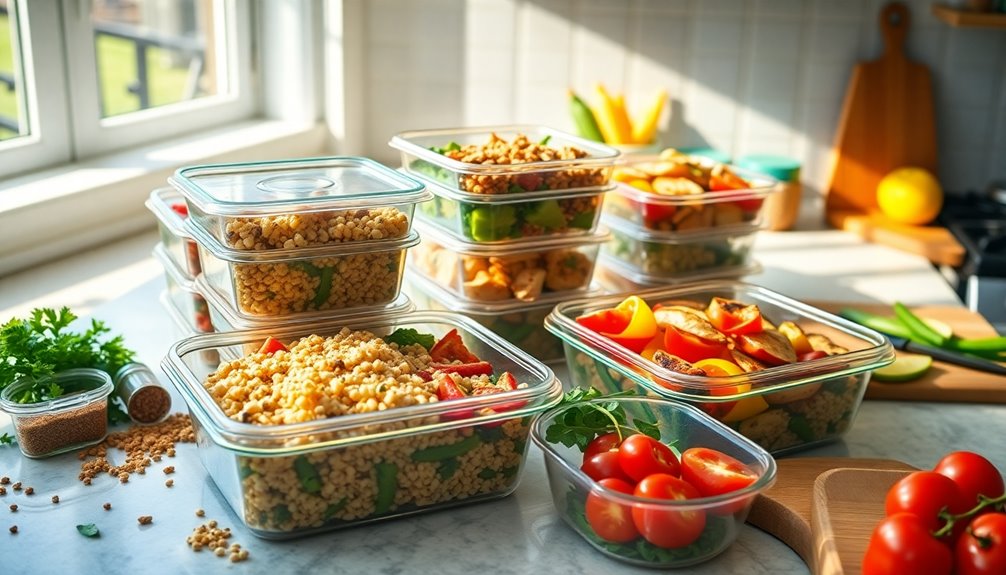
Simple meal prep recipes can make weeknight dinners a breeze, allowing you to enjoy nutritious meals without the stress of last-minute cooking. By planning ahead, you can incorporate time-saving techniques that not only streamline your cooking process but also help you connect with your family over shared meals.
One effective approach is batch cooking. Prepare large quantities of staples like grains, beans, or roasted vegetables. You can mix and match these components throughout the week to create various dishes. For example, cooked quinoa can be transformed into a salad, stuffed peppers, or a hearty bowl with different proteins.
When it comes to kid-friendly options, consider making homemade pizza using whole wheat tortillas or flatbreads. Let your kids customize their toppings with veggies and cheese, making mealtime fun and interactive.
Another great recipe is a one-pan chicken and vegetable bake. Simply season chicken thighs and your choice of vegetables, toss them on a baking sheet, and roast them together. This not only saves time on cleanup but also means you'll have delicious leftovers for lunch the next day.
Don't forget about smoothies! Pre-pack your favorite fruits and greens in freezer bags so you can blend a quick breakfast or snack in minutes. These simple meal prep recipes not only save you time but also foster a sense of togetherness in your family as you create and enjoy meals together. Embrace these strategies, and you'll wonder how you ever managed without them! Additionally, incorporating protein-packed vegan smoothies into your routine can enhance energy levels and support weight loss efforts.
Tips for Efficient Meal Prep
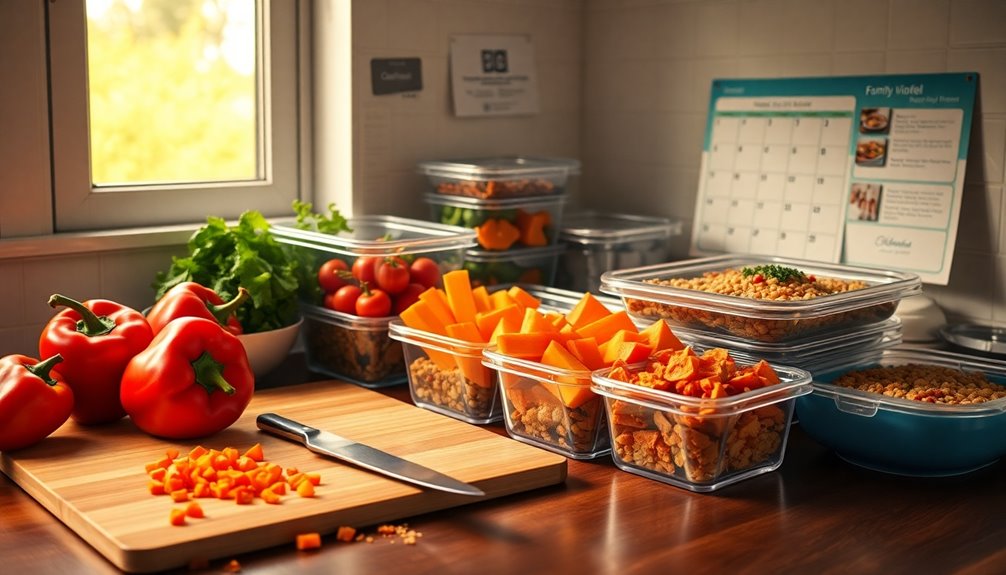
To make meal prep efficient and stress-free, start by organizing your kitchen and creating a meal plan for the week. Begin by decluttering your countertops and arranging your utensils and ingredients in a way that's easy to access. Having a clean, organized space helps you feel more in control and ready to tackle meal prep.
Next, set aside a specific day and time for your meal prep. This consistency allows you to develop a routine and makes you less likely to skip it. During this designated time, use time-saving techniques like batch cooking and prepping ingredients in advance. For instance, chop vegetables or marinate proteins ahead of time, so they're ready to go when you need them.
When planning your meals, consider using a theme for each day, like Meatless Mondays or Taco Tuesdays. This not only simplifies your decision-making but also encourages family participation, making it a fun activity. Include your family in the planning process to foster a sense of belonging and teamwork.
Lastly, keep a list of your go-to recipes and a stocked pantry with essentials. This will save you time and energy when creating your meal plan. By focusing on kitchen organization and implementing these time-saving techniques, you can transform your meal prep into a seamless and enjoyable experience for your whole family. Additionally, incorporating mini bands for effective workouts can help you stay active while managing your busy schedule. Happy cooking!
Storage Solutions for Meal Prep
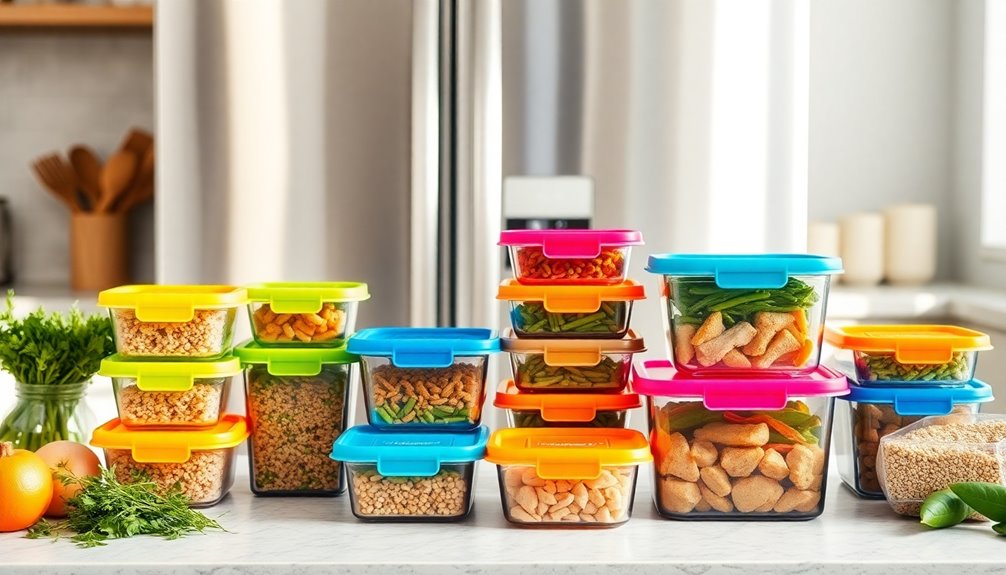
Effective storage solutions are fundamental for keeping your meal prep organized and fresh. When it comes to choosing container options, think about durability, size, and versatility. Glass containers are a top choice since they're microwave-safe, dishwasher-friendly, and don't stain easily. If you prefer lightweight options, BPA-free plastic containers can be a budget-friendly alternative. Look for containers with airtight lids to keep your meals fresh longer.
For families, it's also vital to maintain proper freezer organization. Start by labeling each container with the date and contents, so you know what you have on hand. Use stackable containers to maximize space and keep your freezer tidy. Consider investing in freezer bags for items like chopped vegetables or marinated proteins; they save space and allow you to squeeze out excess air for better preservation.
Another practical tip is to group similar items together. For example, keep all your meal components—proteins, grains, and veggies—in designated sections. This not only simplifies meal assembly but also helps you spot what needs to be used first.
Lastly, if you're cooking large batches, portion out meals into single servings. This way, everyone gets their own meal, and it encourages kids to take part in the process. With the right container options and smart freezer organization, you'll find that meal prep becomes a seamless part of your family routine, making mealtime more enjoyable and less stressful. Additionally, incorporating healthy meal options into your prep can lead to better overall nutrition for your family.
Frequently Asked Questions
How Can I Involve Kids in Meal Prepping Activities?
Involving kids in meal prepping can be fun and educational! Start by choosing kid-friendly recipes that excite their taste buds. Assign age-appropriate tasks like washing veggies, measuring ingredients, or stirring mixtures. This hands-on experience teaches them valuable skills while fostering a sense of belonging in the kitchen.
Plus, it's a great way to bond as you create delicious meals together. Enjoy the process, and watch their confidence grow with each prep session!
What Kitchen Tools Are Essential for Meal Prepping?
Imagine you're juggling work, kids, and daily meals—it's chaotic. To simplify, essential kitchen tools can transform your cooking routine.
A good set of meal prep containers helps with kitchen organization, keeping everything neat and accessible.
A sharp knife speeds up your chopping, enhancing time management.
Investing in a food scale can guarantee portion control.
These tools don't just streamline your process; they create a sense of belonging and togetherness in your cooking environment.
Can I Meal Prep for Special Dietary Needs?
Absolutely, you can meal prep for special dietary needs! Start by exploring gluten-free options like quinoa, rice, or legumes, which are versatile and satisfying. For vegan alternatives, incorporate beans, lentils, and a variety of vegetables into your meals. Planning ahead helps you avoid last-minute decisions and guarantees you adhere to your dietary preferences.
Plus, sharing meals with friends who've similar needs fosters a sense of community and belonging. Enjoy the process!
How Long Can Prepped Meals Stay Good in the Fridge?
When it comes to your delicious prepped meals, think of them as treasures needing proper storage to maintain their charm. Generally, you can savor those meals for about three to four days in the fridge. Make sure you follow food safety guidelines by sealing them tightly in containers to keep them fresh.
What Are Some Quick Snacks to Include in Meal Prep?
When you're planning quick snacks for meal prep, think about nutritious options like sliced veggies with hummus, Greek yogurt with granola, or homemade energy bites. These portable choices make it easy to grab-and-go, fitting perfectly into your busy lifestyle.
You can also consider fruit and nut bars or cheese sticks, which pack protein and healthy fats. By prepping these snacks, you guarantee you'll always have something satisfying on hand for any craving.
Conclusion
Incorporating meal prep into your routine is like setting a financial GPS for your family's nutrition. Not only does it save you time and money, but it also helps you make healthier choices. By using cost-effective ingredients and efficient prep methods, you can whip up delicious meals without the stress. So, immerse yourself in these budget-friendly meal prep ideas, and watch your grocery bills shrink while your family's happiness grows! Your wallet—and your taste buds—will thank you.

